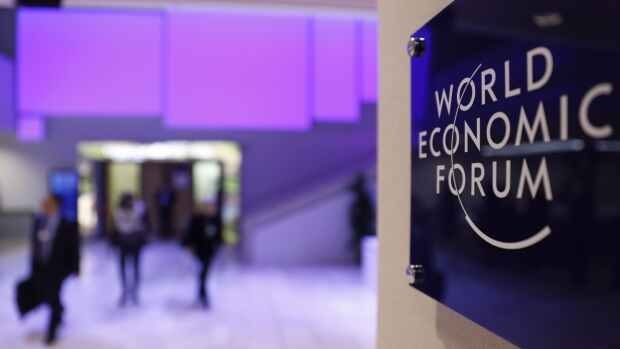Pakistan army says 300 hostages freed from train
Global debt spectre sours Davos cheered by soft landing hopes

FILE - The World Economic Forum logo inside the Congress Center ahead of the World Economic Forum (WEF) in Davos, Switzerland, on Monday, Jan. 15, 2024. The annual Davos gathering of political leaders, top executives and celebrities runs from January 15 to 19. [File photo: Stefan Wermuth/Bloomberg]
Too much debt — and the danger that global economies could take on even more of it — is troubling Davos participants confronting dangers posed by the year ahead.
While several attendees at the World Economic Forum took comfort this week from the mounting likelihood that swiftly jacked-up interest rates won’t cause immediate damage to growth, they’re now worrying again about the lingering financial impact.
A panel called “Pulling Debt Back from the Brink” featured Sri Lanka’s president worrying about balance-of-payments pressures, and Harvard University’s Ken Rogoff lamenting that whoever wins the US election will end up borrowing more. Such sentiments were on show outside the Swiss village’s conference center too.
“This year, we are more worried about liquidity problems,” said Gita Gopinath, the International Monetary Fund’s No. 2 official, told Bloomberg Television’s Francine Lacqua, observing that “debt is at extremely high levels.”
The backdrop is an environment of markedly elevated borrowing costs that seems likely to endure even if rates do begin to fall amid more volatility in inflation that will keep central banks focused on consumer-price risks.
Meanwhile countries are also contending with the legacy of swelled public finances dating from the pandemic, the need to keep up with competing spending demands on areas ranging from climate transition to defense, and the consequences of the US continuing to add to its debt pile.
With Donald Trump’s grip on the Republican nomination intensifying, attendees struggled to agree on the fiscal prospects of him or President Joe Biden winning occupancy of the White House.
Standard Chartered Plc Chief Executive Officer Bill Winters reckoned a Democrat victory could augur more rectitude, though he also wondered aloud if investors might ultimately impose order through a failed bond auction.
“There’s very little sign of fiscal discipline from either party now,” he said. “But reality finds ways of biting.”
Both Republicans and Democrats are likely to keep borrowing if given a big enough mandate, according to Rogoff, a former IMF chief economist and a public finance specialist.
“If Trump wins, I have no idea what the policies are going to be — I suspect he has no idea what the policies are going to be — but I suspect somehow it ends up in a lot bigger debt,” he said.
Gopinath, the IMF’s first deputy managing director, cited the fallout on the rest of the world, particularly developing and emerging markets, of even more Treasury borrowing.
“When you put that much of US bonds on the market, it can crowd out other kinds of funding around the world,” she said, while also citing about other stresses. “Many countries borrowed a lot during the pandemic. That was short-term in nature, and that’s coming due.”
The example of Italy, whose debt is still stuck at 140% of gross domestic product, remains a focus of central-bank officials, investors and ratings companies. Intesa Sanpaolo Chief Executive Officer Carlo Messina acknowledged that the ratio is high, but insisted that it’s “sustainable.”
Elsewhere, the stresses are even greater. A sovereign-debt crisis is the biggest issue facing Africa right now, Nonkululeko Nyembezi, chairwoman of the continent’s biggest bank by assets, told another Davos panel.
Rogoff said that the public situation of many developing countries is “untenable.”
“I actually don’t think there’s a resolution that doesn’t involve a lot of debt writedowns, and transfers — and debt forgiveness,” he said.












Leave a Reply
Be the First to Comment!
You must be logged in to post a comment.
You must be logged in to post a comment.